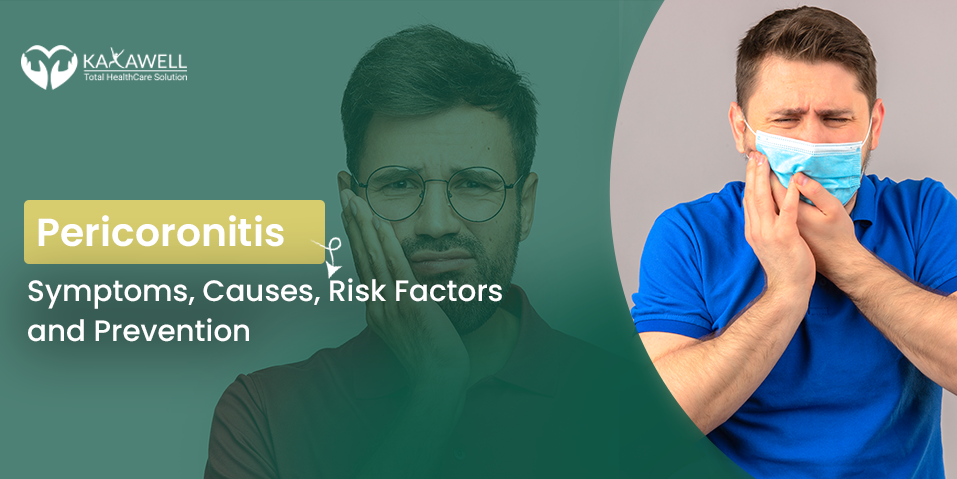What is Pericoronitis?
Pericoronitis is an inflammation of the tissue around a third molar, otherwise known as a dent of wisdom (wisdom tooth). The condition most often occurs in molars that are partially impacted, or not fully visible. It’s also more common in lower molars than in the upper ones.
Most people with pericoronitis have a gum tissue flap which partially covers the crown of the erupting tooth.
Based on a variety of factors, your doctor can recommend that the flap be removed or the tooth extracted. Sometimes, the best course of action is merely to treat the actual symptoms.
What are the symptoms of Pericoronitis?
Pericoronitis signs differ depending upon whether the disorder is acute or chronic.
The symptoms of acute pericoronitis include:
- Severe pain near your back teeth
- Swelling of gum tissue
- Pain when swallowing
- The discharge of pus
- Trismus (lockjaw)
Chronic pericoronitis can include the following symptoms:
- Bad breath
- A bad taste in your mouth
- A mild or dull ache lasting for one or two days
When to call your doctor?
Follow your dentist’s recommended schedule for regular checkups. If you experience any parodontitis signs, make an appointment with your dentist as soon as possible. The sooner you look for care, the better your chances of reversing periodontitis damage are.
What are the causes?
Pericoronitis is widespread in people in their 20s, with around 81 per cent of those affected aged between 20 and 29.
Men and women develop pericoronitis in equal numbers.
There are also certain common causes and conditions linked to pericoronitis:
- Poor oral hygiene — this more usually results in acute pericoronitis
- Inflammation of the upper respiratory tract — caused by a virus — often cold — or bacteria, affecting the nose, sinuses, and throat
- stress
- Pregnancy
What are the risk factors for periodontitis?
Factors which can high the risk of periodontitis include:
- Gingivitis
- Poor oral health habits
- Smoking or chewing tobacco
- Recreational drug use, such as smoking marijuana or vaping
- Obesity
- Inadequate nutrition, including vitamin C deficiency
- Genetics
- Hormone changes, such as pregnancy or menopause changes
- Certain medicines which cause changes in the dry mouth or gum
- Conditions that cause decreased immunity, such as leukaemia, HIV/AIDS and cancer treatment
- Certain diseases, such as diabetes, rheumatoid arthritis and Crohn’s disease
Possible complications
Complications associated with pericoronitis can occur. Problems are more likely to happen if the symptoms are not treated promptly.
The infection will also spread from the infected region and can cause swelling and discomfort in certain areas of the head and neck.
Trismus, when a person has difficulty opening his mouth or biting down, may also be a complication.
In rare cases, pericoronitis complications may also pose life-threatening consequences. Untreated pericoronitis can lead to angina in Ludwig, which is an infection spreading under the jaw and tongue. This disorder can also cause certain profound infections in the head, neck, or throat.
There is also the possibility that the infection can spread into the bloodstream, in a condition known as sepsis, which can also be life-threatening.
What home remedies can you do for pericoronitis?
Proper oral hygiene remains the best home remedy you can make for mild pericoronitis indications. Thoroughly and gently brush your teeth to remove plaque and food. You can also use oral water irrigators to clear particles and bacteria from under the operculum.
To soothe inflammation, you can rinse with warm salt water or diluted hydrogen peroxide to reduce the bacteria.
However, when symptoms are severe, seek proper care from the right healthcare professionals.
Prevention
The best way to prevent periodontitis is to follow a good oral hygiene program, once you start early and practice consistently throughout your life.
- Good oral hygiene. That means at least twice daily — in the morning and before going to bed — brushing your teeth for two minutes and flossing at least once a day. Flossing before brushing allows the loosened food particles and bacteria to be cleaned away. Good oral hygiene prevents the development of an environment around your teeth which is favourable to specific periodontal disease-causing bacteria.
- Regular dental visits. For cleanings, see the dentist or dental hygienist regularly, about every six to twelve months. When you have risk factors that increase the chances of developing periodontitis — such as dry mouth, taking other medications or smoking — you will need more skilled cleaning.

Leave a Reply
You must be logged in to post a comment.